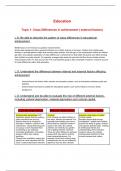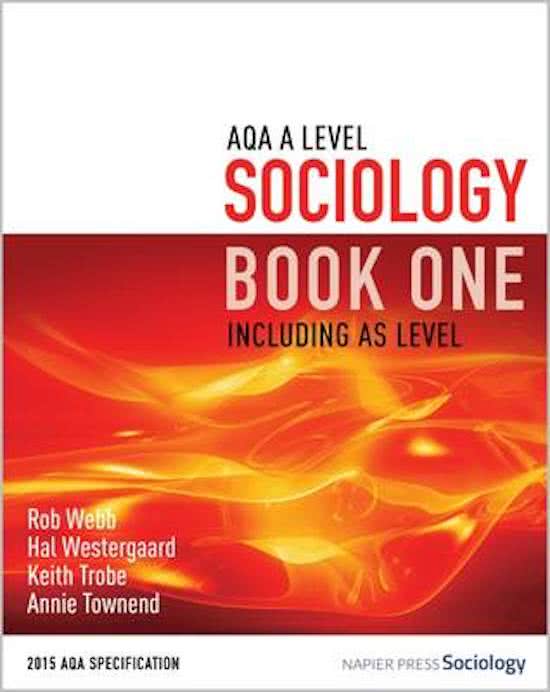Education
Topic 1- Class Differences in achievement ( external factors)
L.O: Be able to describe the pattern of class differences in educational
achievement
Middle-class or non-manual occupations include doctors.
Social class background has a powerful influence on a child's chances of success. Children from middle-class
families on average perform better than working-class children, and the gap on the achievement widens as children
get older. One popular explanation of class differences in achievement is that better-off parents can afford sending
their children to private schools. For example, average class sizes are less than half from those of state schools.
They educate under 7%, they account for 47% of all students going to elite universities. However, it doesn't account
for class differences within state education.
L.O: Understand the difference between internal and external factors affecting
achievement
- Internal factors are factors within schools and education system, such as interactions between pupils and
teachers
- External factors are factors outside the educational system, such as the influence of home, family
background.
L.O: Understand and be able to evaluate the role of different external factors,
including cultural deprivation, material deprivation and cultural capital.
Cultural deprivation Material deprivation Cultural capital
Working-class subcultures:PICF Housing: Bourdieu: three types of capital
Sugarman argues that the working- Poor housing can affect children in Cultural capital:
class subculture has four key two ways; directly and external. For Bourdieu argues that through
features that act as a barrier to example overcrowding can have a socialization , middle-class children
education. Fatalism: a belief in fate direct effect by making it harder to acquire the ability to grasp, analyze
Collectivism: valuing that being part study for the child. By contrast, and express abstract ideas. Leading
of a group is more important than children are indirectly at a greater to intellectual interest and
succeeding as an individual. risk of getting harmed. However, understanding of the education
Immediate gratification: immediate There are other differences between systems values. By contrast,
pleasure rather than making classes that may lead to working working-class families find that
sacrifices. class underachievement. For schools devalue their culture .
Present-time orientation: seeing the example, those from working class
present as more important than the backgrounds are not just materially
future. Cultural deprivation theorists deprived, they are also culturally
, believe large sections of the working deprived.
class have different goals,beliefs,
values from the mainstream society.
However, victim blaming.
Language: Diet and health: Educational and economic capital:
Cultural deprivation theorists believe Howard notes that young people in Bourdieu argues that educational,
that working-class parents often poorer homes suffer from nutritional economic and cultural capital can be
communicate with their children in a problems. For instance if a child converted into one another. For
descriptive way which can affect often goes to school and doesn't eat example, middle- class children with
theory cognitive development and throughout the day, his energy cultural capital are better equipped
their ability to benefit from levels will be lower, leading to to meet the demands of the school
schooling. For example, Hubbs-Tait absences to school because of curriculum and gain qualifications.
et al study found that where children illnesses, and difficulties Similarly, wealthier parents can
use language that challenges their concentrating. However,The convert their economical capital into
understanding, cognitive Cultural Capital of the middle educational capital by sending their
performance improves. However classes also advantages them in childrens to private schools.
Tronya and Williams argue that the education.
problem is not the parents' language
but the school's attitude towards it.
“Speech hierarchy”.
Parents education: Financial Support and cost of
Cultural deprivation theorists argue education:
that parents' attitudes to education Lack of financial support means that
are a key factor in educational children from poor families have
achievement differences. For less equipment to take and use in
example, a study made by Douglas school to enhance their educational
concluded that working- class achievement. Bull refers to this as
parents placed less value on ‘the costs of free schooling’.
education. Internalizing children by Additionally, attending university
placing less ambition in their involves large costs in fees and
children, less encouragement, less working-class students tend to be
attendance, therefore lower debt averse as sociologist Callender
performance. However, Keddie and Jackson argue. This creates a
dismisses the ideas and argues that fear of debt.
working-class children may be
culturally different.
Topic 2- Class differences in achievement (internal factors)
Labelling The self- Streaming Pupil Pupils class
fulfilling Subcultures identities
Prophecy and the
school





